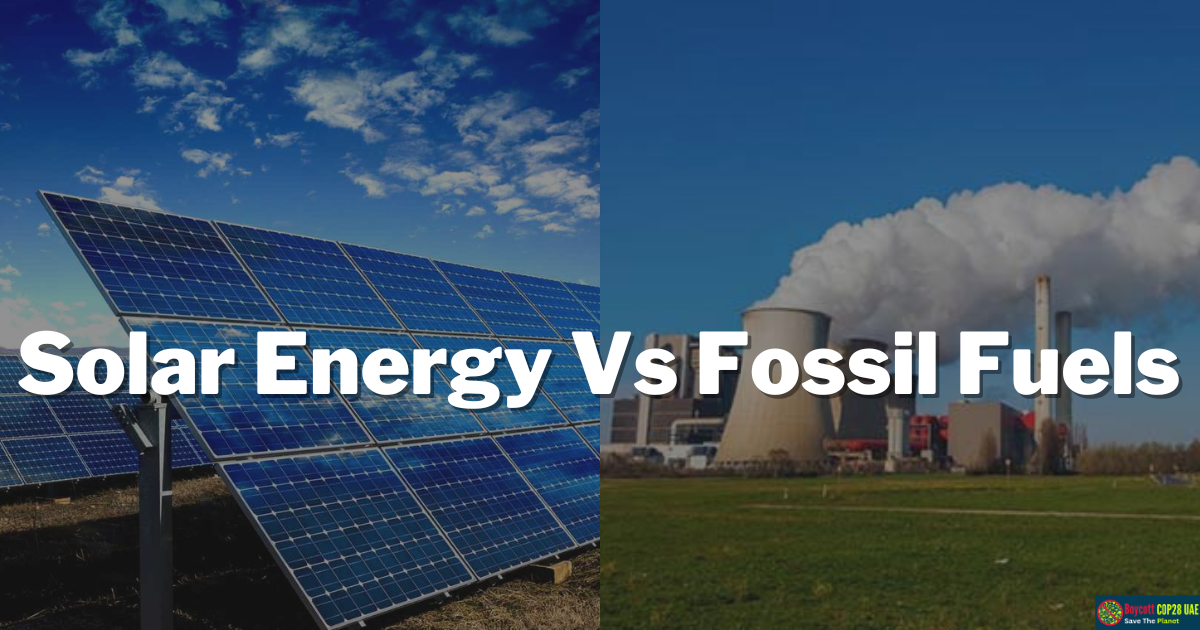As the world grapples with the urgent need to address climate change, the debate between renewable energy and fossil fuels takes center stage. The reliance on fossil fuels has proven costly and detrimental to our planet. In this article, we aim to provide a comprehensive comparison between solar energy and fossil fuels. We will delve into their respective costs, environmental footprints, and the potential ramifications they hold for the forthcoming COP28 conference.
Solar Energy Costs vs. Fossil Fuels Costs
Traditionally, fossil fuels have been considered the most cost-efficient energy source. However, the landscape is shifting rapidly. The cost of renewable energy, including solar and wind power, has plummeted in recent years, making them increasingly viable alternatives to fossil fuels.
According to a Consumer Affairs article from October 2021, the long-term savings of going solar outweigh the higher upfront costs for consumers. Electricity generated from fossil fuels typically ranges from 5 to 17 cents per kilowatt-hour, while solar energy costs vary between 3 and 6 cents per kilowatt-hour and continue to decline.
Which Is Better For The Environment?
Fossil Fuels And Greenhouse Gases
Fossil fuel combustion releases CO2, a greenhouse gas causing climate change. In 2019, CO2 comprised 80% of US human-caused greenhouse gas emissions (EPA). The concentration of atmospheric CO2 has risen by 48% since the Industrial Revolution, primarily due to human activities, according to NASA.
How Can Solar Energy Help?
Solar energy offers a solution to the environmental challenges posed by fossil fuels. Solar power does not require burning fossil fuels, thus minimizing the release of greenhouse gases into the atmosphere. By reducing CO2 emissions, solar energy plays a crucial role in combating climate change.
The National Renewable Energy Laboratory (NREL) studies indicate that a 35% penetration of solar and wind power could result in a 25%–45% reduction in carbon emissions, equivalent to removing 22–36 million cars from the road. Moreover, solar energy is a renewable resource, relying on the infinite power of the sun. Advances in technology aim to improve the efficiency of harnessing solar energy.
Solar Reduces Fossil Fuel Dependence
It is important to recognize that fossil fuels offer short-term cost efficiency for many individuals and economies. Additionally, the fossil fuel industry supports job creation globally. The main issue lies in society’s dependence on fossil fuels rather than their intrinsic use.
Diversifying our energy sources, with solar power as a significant component, can significantly lessen our dependence on fossil fuels and decrease our carbon footprint. Solar energy allows households to become less dependent on the grid. While this may initially seem disadvantageous for utility companies, it relieves strain on the local grid during peak hours.
Furthermore, the growing popularity of solar battery storage enables homeowners to store excess energy for later use. Depending on battery capacity, this capability grants households greater control and energy independence, such as powering homes after sunset or during power outages.
Solar Energy And COP28
As the international community prepares for the 28th Conference of the Parties (COP28), the discussions and decisions made will play a critical role in shaping the future of global energy policies. The shift towards renewable energy, including solar power, will undoubtedly be a key focus.
COP28 allows countries to strengthen commitments to reduce greenhouse gas emissions, increase renewable energy targets, and promote sustainable development. Solar energy can contribute significantly to achieving these goals by offering a clean, abundant, cost-effective energy source.
UAE And Fossil Fuels
The United Arab Emirates (UAE) is a country heavily reliant on fossil fuels for its energy needs. In 2020, fossil fuels accounted for 90% of the UAE’s energy mix. This reliance on fossil fuels has a number of negative environmental impacts, including:
- Fossil fuel burning causes air pollution, respiratory issues, heart disease, and cancer. The UAE has some of the highest air pollution levels in the world
- Water pollution: Fossil fuel activities can pollute water. In the UAE, this has led to the contamination of groundwater and surface water
- Climate change: Fossil fuel burning emits greenhouse gases, fueling climate change. This country emits large amount of greenhouse gases per capita
Conclusion
Solar energy has emerged as a viable alternative to fossil fuels economically and environmentally. The declining solar power costs make it an attractive option for consumers and industries worldwide. Solar energy plays a crucial role in mitigating climate change by reducing greenhouse gas emissions. Additionally, solar power promotes energy independence and reduces our dependence on fossil fuels.
As the world gathers for COP28, embracing solar energy and other renewable sources will be vital in shaping a sustainable future. By prioritizing the transition to clean energy, we can pave the way for a greener and more resilient planet for future generations.






